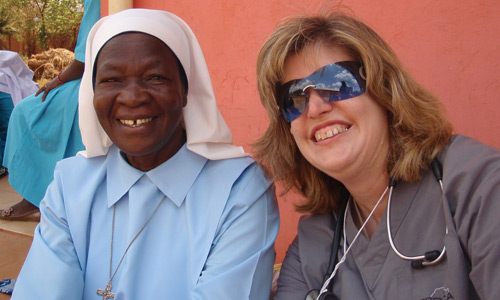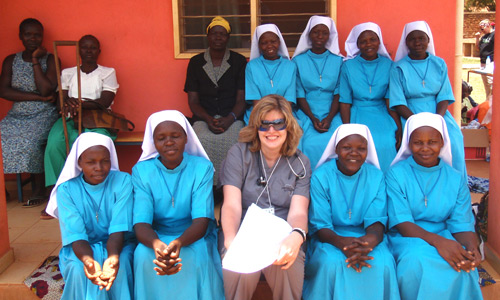Nursing Professor Uses Medical Skill to Serve in Uganda
May 16, 2012
While many people welcome the arrival of a school break as an opportunity to spend time with friends and family, take a vacation or simply relax, OBU professor Karen Cotter chose to spend her spring break week meeting medical needs in Uganda.
Cotter traveled to Uganda with a group called Pros For Africa. The purpose of the trip was to assess and meet health needs and concerns of the faculty and students at St. Monica Girls' Tailoring Centre in Gulu, Uganda. Pros For Africa (PFA) supports the school monetarily and by providing human resources.

Karen Cotter waits outside a clinic in Uganda with the teacher of Catholic school students who have come to receive medical attention.
The school meets the needs of girls affected or victimized by wartime atrocities, including kidnapping, human trafficking, prostitution and joining the military regime by force. The school is on a gated campus, and student identities are well-protected. Students who attend St. Monica's learn skills they use to support themselves when they leave the school. Educational programs include looming, sewing, business principles and catering or cooking classes.
An OBU graduate, Cotter serves as assistant professor of nursing. She sponsors OBU's chapter of Student Nurses Association and actively participates in the Oklahoma Nurses Association.
Although Cotter's typical spring break has been spent in Arizona watching baseball games each afternoon, she said God communicated clearly to her that she should go on this trip. Cotter said she heard about the trip from a friend in her Sunday school class, and within seven days she had secured her airline tickets and immunizations and was ready for travel.
"God worked out a lot of the details in a way that told me that this was His plan for my spring break," Cotter said.
While in Gulu, the medical team conducted health assessments, visiting with clients in the St. Monica's clinic and the school grounds. A primary goal was setting up a medical record system to track health statuses of students and faculty. On the final day, Cotter took her group to a local primary school, anticipating meeting with 20-40 children. They arrived instead to find more than 130 children. The team spent the day assessing children in a building with no fans, lights or air conditioning, identifying three children with significant health care needs and 25 children whose needs were not as immediate but would benefit from seeing a doctor or dentist.
"My scrubs were gray when I arrived at this primary school," Cotter said. "After assessing children for a few hours, they were absolutely brown from all of the dirt on the children."
This trip was similar to other trips Cotter has taken in the past, in terms of meeting health concerns of "needy" and "underserved" people, but different in other ways. Although Cotter had traveled overseas before, this was her first time to travel with a group she did not know. After arriving in Uganda, she discovered she was in charge of the nursing team, which consisted entirely of unlicensed nurses, students and recent graduates of nursing programs. Cotter said her situation was challenging initially because those on her team did not have the expertise to complete many tasks she would typically require of nurses in the same situation.
Cotter said Uganda was a different place than she had ever been before, noting priority for safety was a factor during the trip. PFA had hired Ugandan police to accompany the team daily as they were transported between the hotel and the school. The troops were also on duty overnight at the hotel.
"They carried multiple large rifles, and vehicles were equipped with lights and sirens everywhere we went," Cotter said. "We were a spectacle, I am sure."
Cotter said she enjoyed meeting the Americans she traveled with, as well as the faculty and students from the school. After assessing and becoming acquainted with a group of Ugandan sisters in their early 20s, Cotter gave them the opportunity to visit a doctor for "interventions" for health concerns. She said this experience was particularly rewarding because she provided availability for health care the young women would not have had access to or be able to afford otherwise.
The most difficult part of the trip for Cotter was the African conditions, especially the intense heat and malaria-carrying mosquitoes.

"Every day began with a coat of SPF 50 sunscreen followed by a coat of 40 percent Deet bug repellent lotion," Cotter explained. "The two combined for protection against the elements but also served as a magnet for the accumulation of dirt and dust on my skin. Even in our nice hotel, we slept under the protection of mosquito nets."
Regardless of the challenging living conditions, Cotter said her "life call" is to reach out to others with the skills and education God has given her. She said she feels blessed to have achieved an education as a registered nurse and serve as a nurse educator, and mission trips allow her to fulfill her desire to serve others while keeping her career in nursing education.
Mission trips also give Cotter the chance to expand her professional nursing practice and view ways of living in other countries. One OBU course she teaches, "Health Promotion in Diverse Populations," has been enriched by her overseas experiences because she is able to share her firsthand involvement and understanding with students.
"Human needs are essentially the same; [they are] just being met in a different geographic locale," Cotter said. "In terms of my undergraduate nursing courses, I think my exposures and application of nursing skills across cultures helps me to instill a sense of global consciousness to my students as they are building their identities as professional nurses.
"At the graduate and undergraduate level of nursing education, I hope that my example of global service would inspire [students] to reach out to people different than themselves, to meet needs of others in their circles of influence," Cotter continued.
Thinking back to St. Monica's school, Cotter said she envisions a time in the future when one of the programs offered is a nurse assistant training program. After teaching similar programs in other developing countries, she strongly believes these methods could be successfully applied to the St. Monica's students, providing the students with skills to support themselves and their families in the future.